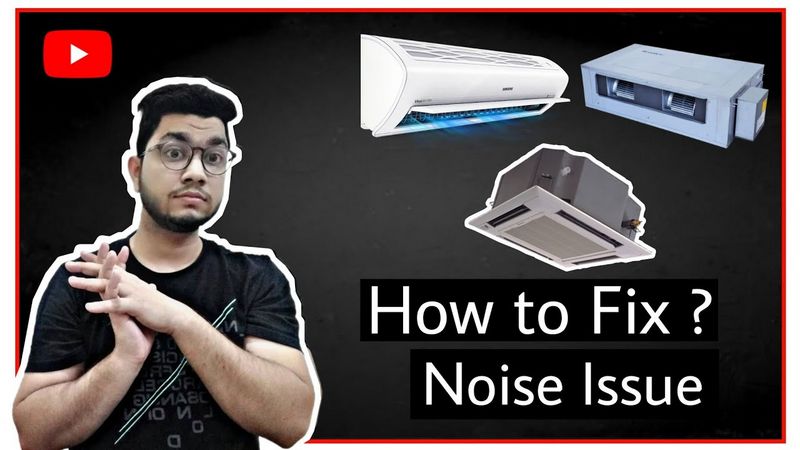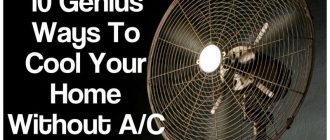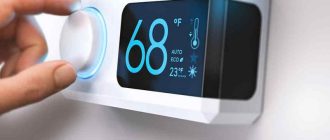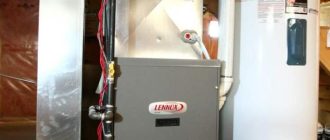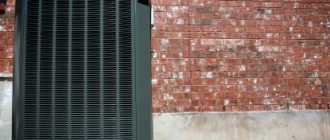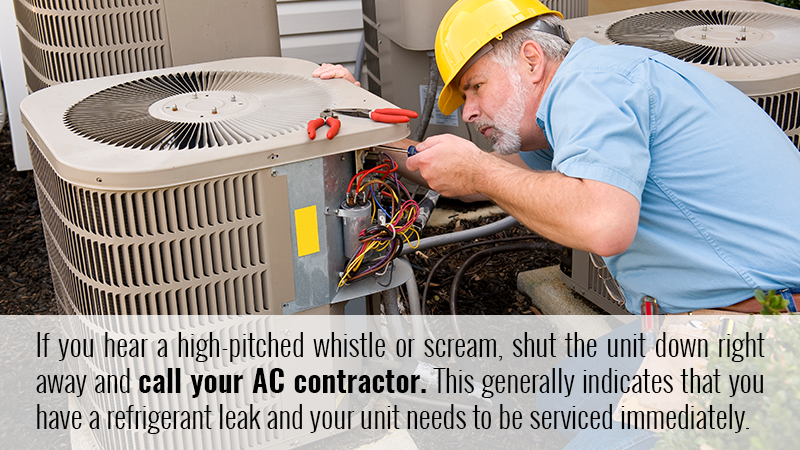
How to Troubleshoot Air Conditioner Noises?
Is your air conditioner making strange noises? Don’t panic! The good news is that many air conditioner noises can be fixed with simple troubleshooting techniques.
One common noise is a rattling or buzzing sound. This could be caused by loose parts or debris in the unit. Before calling a professional, try tightening any loose screws or bolts and removing any visible debris from the unit. If the noise persists, it may be time to call in a technician.
Another noise to watch out for is a squealing or screeching sound. This could be a sign that the fan belt is worn or out of alignment. To fix this, turn off the power to the unit and carefully inspect the fan belt. If it appears worn or loose, you can try tightening it or replacing it yourself. However, if you are unsure or uncomfortable doing this, it’s best to call a professional.
If you hear a hissing or bubbling noise, it could be due to a refrigerant leak. This is a serious issue and should be addressed by a professional immediately. Refrigerant leaks not only reduce the efficiency of your air conditioner, but they can also pose health risks. Don’t ignore this noise – call a technician as soon as possible.
By learning how to troubleshoot air conditioner noises, you can save yourself time and money. However, it’s important to know when to call in a professional. If your troubleshooting efforts don’t fix the problem or if you are uncomfortable making repairs yourself, it’s always best to seek the help of a trained technician. They have the knowledge and experience to diagnose and resolve any issues with your air conditioner.
How to Diagnose Air Conditioner Noises: A Step-by-Step Guide
If your air conditioner is making strange noises, it can be a sign of a problem that needs to be addressed. By diagnosing the noises, you can pinpoint the issue and take the necessary steps to fix it. Here is a step-by-step guide to help you diagnose air conditioner noises:
- Identify the type of noise: The first step is to determine what type of noise your air conditioner is making. Is it a buzzing, rattling, hissing, or grinding sound? Different noises can indicate different issues.
- Check the fan motor: Start by inspecting the fan motor. Turn off the power to the air conditioner and remove the access panel. Look for any signs of wear or damage, such as loose screws or bent blades. If everything looks fine, give the blades a spin to see if they rotate smoothly.
- Inspect the condenser coils: The condenser coils can collect dirt and debris over time, causing airflow restrictions and noise. Check if the coils are dirty and clean them if necessary. Use a soft brush or a vacuum cleaner to remove any dirt or debris.
- Check the compressor: The compressor is responsible for pressurizing the refrigerant and circulating it through the system. A faulty compressor can cause loud noises. Listen for any clicking or clunking sounds coming from the compressor. If you suspect a problem, it’s best to contact a professional technician.
- Inspect the blower wheel: The blower wheel draws air into the air conditioner and circulates it throughout the system. If the wheel is loose or damaged, it can cause loud noises. Turn off the power and check for any signs of wear or damage. Tighten any loose screws and replace the wheel if necessary.
- Check the ductwork: Damaged or loose ductwork can also cause noise. Inspect the ductwork for any cracks, gaps, or loose connections. Use duct tape or mastic sealant to secure any loose sections and seal any gaps.
- Listen for refrigerant leaks: If you hear a hissing sound, it could indicate a refrigerant leak. Refrigerant leaks are serious and can cause the system to malfunction. If you suspect a refrigerant leak, turn off the air conditioner and contact a professional technician.
Remember, if you are unsure of how to diagnose the noise or don’t feel comfortable handling the repairs yourself, it’s always best to contact a professional HVAC technician. They have the expertise and tools to diagnose and fix any issues with your air conditioner.
Understanding the Importance of Identifying Air Conditioner Noises
Identifying air conditioner noises is an essential skill for homeowners. When your air conditioner starts making unusual sounds, it can indicate a problem that needs to be addressed. By understanding the importance of identifying these noises, you can take proactive steps to address any issues and prevent further damage.
Here are a few reasons why identifying air conditioner noises is important:
- Early detection of problems: Unusual noises from your air conditioner can be an early warning sign of a potential issue. By identifying these noises early on, you can prevent minor problems from turning into major repairs or complete system failure.
- Cost savings: Addressing small repair issues early can save you money in the long run. Ignoring strange noises from your air conditioner can lead to more significant and costly repairs down the line.
- Improved energy efficiency: A well-maintained air conditioner operates more efficiently, which can help reduce your energy bills. Noises from your air conditioner could indicate inefficiencies or problems that are causing your system to work harder than necessary.
- Enhanced comfort: If your air conditioner is making loud or disruptive noises, it can impact your overall comfort at home. Identifying and resolving these noise issues will help ensure a peaceful and comfortable environment.
Identifying air conditioner noises can be done by listening carefully and noting any changes or unusual sounds. Common noises to be aware of include banging, rattling, buzzing, squealing, or grinding sounds. Additionally, pay attention to any changes in the volume or frequency of the noises.
While some noises may be simple to resolve, others may require professional assistance. It’s essential to be proactive and address any concerns promptly to prevent further damage to your air conditioning system.
In conclusion, understanding the importance of identifying air conditioner noises is crucial for homeowners. By recognizing and addressing these noises early on, you can save money, prevent more significant repairs, and ensure optimal comfort and energy efficiency in your home.
Common Air Conditioner Noise Problems and Their Causes
When it comes to air conditioners, it’s not uncommon for them to make noise while they’re operating. However, some noises can indicate a larger issue that needs to be addressed. Here are some common air conditioner noise problems and their causes:
- Banging or slamming sound: If you hear a loud banging or slamming sound coming from your air conditioner, it could be a sign that the motor or blower wheel is out of balance. This imbalance can be caused by dirt and debris build-up or a damaged fan blade.
- Screeching or squealing sound: A screeching or squealing sound usually indicates a problem with the fan motor or belt. The fan motor may need lubrication, or the belt may need to be replaced if it’s worn or damaged.
- Rattling or vibrating sound: Rattling or vibrating noises can be caused by loose parts, such as screws or panels. The condenser coil or outdoor unit may also be dirty, causing the unit to vibrate excessively.
- Hissing or bubbling sound: If you hear a hissing or bubbling sound, it could be a refrigerant leak. A refrigerant leak is a serious issue that should be addressed by a professional as soon as possible, as it can lead to a loss of cooling capacity and potential harm to the environment.
- Gurgling or whistling sound: Gurgling or whistling sounds often indicate a problem with the refrigerant flow. It could be a sign of a clogged or restricted refrigerant line, which can cause the system to work harder and decrease its efficiency.
If you notice any of these noises coming from your air conditioner, it’s important to address the issue promptly. Regular maintenance and cleaning can help prevent some of these problems, but if the noise persists, it’s best to seek professional assistance to diagnose and repair the issue.
Recognizing Different Types of Air Conditioner Noises
When dealing with a noisy air conditioner, it’s important to be able to identify the type of noise it is making. Different noises can indicate different issues with your AC unit. Here are some common types of air conditioner noises and what they might mean:
- Rattling or Clanking: If you hear a rattling or clanking noise coming from your air conditioner, it could be a sign of loose or broken parts. Check the fan and motor components for any visible damage or wear. Tighten any loose screws or bolts and replace any damaged parts as needed.
- Buzzing or Humming: A buzzing or humming noise from your air conditioner could be a sign of an electrical problem. Check the electrical connections and wiring. It’s important to hire a professional electrician to handle any electrical repairs or replacements.
- Clicking: Clicking noises can be normal when your air conditioner turns on or off. However, if you notice frequent or loud clicking sounds, it might indicate a faulty control relay or a problem with the thermostat. Consider having a professional inspect and repair these components.
- Squealing or Screeching: A squealing or screeching noise usually indicates a problem with the fan motor or belt. It could be due to lack of lubrication or general wear and tear. Lubricate the fan motor or replace the belt to resolve the issue.
- Gurgling or Bubbling: Hearing gurgling or bubbling noises from your air conditioner can be a sign of a refrigerant leak. This requires immediate attention from a professional HVAC technician to locate and repair the leak and recharge the refrigerant levels.
If you notice any of these noises or any other unusual sounds coming from your air conditioner, it’s best to address the issue as soon as possible. Ignoring strange noises can lead to further damage and more costly repairs. Contact a professional HVAC technician if you’re unsure about diagnosing or fixing the problem yourself.
Noise Reduction Techniques for Air Conditioners
If your air conditioner is making excessive noise, it can be quite bothersome and disruptive. Fortunately, there are several effective techniques you can use to reduce the noise produced by your air conditioner.
- Regular Maintenance: One of the most important steps in preventing excessive noise from your air conditioner is to ensure it is well-maintained. Regularly cleaning or replacing air filters, cleaning condenser coils, and lubricating moving parts can help reduce noise caused by dirt or friction.
- Insulate the Unit: To minimize noise transmission from your air conditioner, consider insulating the unit. You can use specialized soundproofing materials, such as acoustic foam or mass-loaded vinyl, to reduce noise leakage. Be sure to follow the manufacturer’s instructions and consult a professional if needed.
- Install Vibration Pads: If your air conditioner is vibrating excessively and causing noise, installing vibration pads can help absorb and reduce the vibration. These pads can be placed between the air conditioner unit and the surface it rests on, such as the ground or a concrete pad.
- Use Rubber Mounts or Isolators: Another option to reduce vibration and noise is to install rubber mounts or isolators. These are designed to isolate the air conditioner unit from the surrounding structure, minimizing the transfer of vibrations and noise.
- Check for Loose Parts: Loose parts, such as fan blades or screws, can create rattling or buzzing noises. Regularly inspect your air conditioner for any loose parts and tighten or replace them as necessary.
- Consider Noise-Reducing Accessories: Some air conditioner manufacturers offer noise-reducing accessories or upgrades that can help minimize noise. These may include specially designed fan blades, sound blankets, or compressor jackets. Check with your manufacturer or a professional technician to see if such accessories are available for your unit.
By following these noise reduction techniques and ensuring proper maintenance, you can significantly reduce the noise produced by your air conditioner, creating a more comfortable and peaceful environment in your home or office.
Steps to Locate the Source of Air Conditioner Noises
When your air conditioner starts making strange noises, it can be frustrating and concerning. However, by following a few simple steps, you can quickly locate the source of the noise and determine if you need to call a professional for repairs or if it is something you can fix yourself.
- Identify the type of noise: Start by listening to the noise and try to identify its type. Is it a rattling, buzzing, squealing, or grinding noise? Different noises often indicate different problems with the air conditioner.
- Inspect the air conditioner unit: Carefully examine the air conditioner unit to see if there are any loose or damaged parts. Check the fan blades, motor, compressor, and other components for any signs of wear or damage.
- Check the air filter: A clogged or dirty air filter can cause the air conditioner to work harder, leading to increased noise levels. Remove the air filter and clean or replace it if necessary.
- Inspect the condenser unit: If the noise is coming from the outdoor unit, check the condenser coils for any debris or obstructions. Clear away any leaves, branches, or other debris that may be blocking the airflow.
- Listen for unusual sounds in specific areas: Pay attention to where the noise is coming from. If it seems to be coming from the ducts or vents, there may be an issue with the ductwork or a problem with the blower motor.
- Consult the owner’s manual: Refer to the owner’s manual for your specific air conditioner model. It may provide troubleshooting tips and diagrams to help you locate and resolve the noise issue.
- Consider professional help: If you are unable to locate the source of the noise or if you are uncomfortable performing any repairs yourself, it is best to contact a professional HVAC technician. They have the knowledge and experience to diagnose and fix air conditioner issues safely and efficiently.
Remember, it is important to address air conditioner noises promptly to prevent further damage. Ignoring unusual noises can lead to more serious problems and potentially costly repairs in the future. By following these steps, you can quickly locate the source of the noise and take the necessary steps to resolve the issue.
Troubleshooting Air Conditioner Noises: Tools You’ll Need
When it comes to troubleshooting air conditioner noises, having the right tools can make the process much easier. Here are some essential tools you’ll need to effectively diagnose and fix common AC noise problems:
- Screwdriver Set: A set of screwdrivers with various sizes and types will be essential for removing panels, accessing different parts of the air conditioner, and making adjustments.
- Wrench Set: A wrench set, including both open-end and adjustable wrenches, will be useful for tightening or loosening bolts and nuts.
- Multimeter: A multimeter is a device used to measure voltage, current, and resistance. It can be used to test electrical components within the air conditioner and check for any malfunctions.
- Socket Set: A socket set will come in handy when removing or installing components that require a specific socket size. It will allow you to easily tighten or loosen bolts and screws.
- Wire Cutters: Wire cutters are necessary for cutting and stripping wires. They can be used to replace damaged or faulty wiring that may be causing the noise.
- Lubricant: A lubricant, such as a silicone-based spray, can be applied to moving parts that may be causing friction and noise. It will help reduce friction and keep the parts operating smoothly.
- Cleaning Supplies: Cleaning supplies, such as a vacuum cleaner and a soft brush, will be needed to remove dirt, debris, and dust from different parts of the air conditioner. This can help eliminate noise caused by clogged or dirty components.
- Replacement Parts: Depending on the issue, you may need to have some replacement parts on hand, such as fan blades, belts, motors, or filters. Always ensure you have the correct parts for your specific air conditioner model.
With these essential tools at your disposal, you’ll be well-equipped to troubleshoot and resolve air conditioner noise problems. Remember, if you’re unsure about any aspect of the troubleshooting process or if the issue seems complex, it’s always best to consult a professional HVAC technician.
How to Fix Squealing Noises Coming from the Air Conditioner
If your air conditioner is making a squealing noise, it is most likely due to a problem with the fan or belt. Here are some steps you can take to troubleshoot and fix the issue:
- Turn off the air conditioner: Before you start troubleshooting, make sure to turn off the AC unit. This will prevent any potential injuries or damage to the system.
- Inspect the fan: Check if the fan blades are loose or damaged. Tighten any loose screws and replace any broken blades. If the fan itself is the issue, consider contacting a professional to replace it.
- Check the belt: The squealing noise could be caused by a loose or worn-out belt. If you are comfortable doing so, check the belt for any signs of wear or damage. Replace the belt if necessary.
- Lubricate the fan motor: Apply lubricating oil to the fan motor if it seems to be the source of the squealing noise. This can help reduce friction and eliminate the noise. Be sure to follow the manufacturer’s instructions for lubricant application.
- Inspect the pulleys: Check the pulleys connected to the belt for any signs of wear or misalignment. If necessary, adjust or replace the pulleys to ensure smooth operation.
- Call a professional: If you have tried all the above steps and the squealing noise persists, it is best to call a qualified HVAC technician. They will have the expertise and tools to diagnose and resolve the issue safely.
Remember, regular maintenance and inspection of your air conditioner can help prevent issues like squealing noises. Schedule annual maintenance checks to keep your AC running smoothly and efficiently.
Dealing with Rattling or Banging Noises from the Air Conditioner
If you are hearing rattling or banging noises coming from your air conditioner, it is important to address the issue as soon as possible. These noises can indicate a problem with the internal components of the unit, and if left untreated, they can lead to further damage and potentially costly repairs. Here are some steps to help you troubleshoot and resolve rattling or banging noises from your air conditioner.
- Check for loose components: Start by inspecting the external components of the air conditioner, such as the fan blades, panels, and bolts. Tighten any loose parts using a screwdriver or wrench. Loose components can create vibrations that cause rattling or banging noises.
- Inspect the fan motor: The fan motor is responsible for circulating air throughout the unit. Over time, the motor may become loose or develop worn-out bearings, resulting in rattling noises. Remove the access panel and visually inspect the fan motor. If you notice any looseness or signs of damage, it may be necessary to replace the fan motor.
- Clean or replace the air filter: A dirty or clogged air filter can restrict airflow and cause the air conditioner to work harder, leading to rattling or banging noises. Remove the air filter and clean it using a vacuum or replace it if necessary. Regularly cleaning or replacing the air filter can help prevent noise issues and improve the overall performance of your air conditioner.
- Check the compressor: The compressor is responsible for compressing and circulating the refrigerant throughout the system. A malfunctioning or failing compressor can produce banging noises. Listen for any unusual sounds coming from the compressor and inspect it for any visible signs of damage. If you suspect an issue with the compressor, it is best to contact a professional HVAC technician for further diagnosis and repair.
- Inspect the ductwork: Improperly installed or damaged ductwork can cause rattling or banging noises. Inspect the ductwork for any loose or disconnected sections. Secure any loose sections using metal tape or contact a professional to repair or replace damaged ductwork. Ensure that the air conditioner is properly sealed to the ductwork to prevent air leaks and reduce noise.
If you have tried these troubleshooting steps and are still experiencing rattling or banging noises from your air conditioner, it is recommended to contact a licensed HVAC technician. They will have the expertise and tools to diagnose and resolve any underlying issues with your air conditioner, ensuring efficient and quiet operation.
Grinding Noises? Here’s What You Can Do
If you are hearing grinding noises coming from your air conditioner, it is important to address the issue as soon as possible. These noises can indicate a serious problem with your unit that could lead to further damage if left unresolved. Here are some steps you can take to troubleshoot and resolve the issue:
- Turn off the unit: The first thing you should do when you hear grinding noises is to turn off your air conditioner. This will help prevent any further damage from occurring.
- Inspect the fan motor: Grinding noises can often be caused by a malfunctioning fan motor. Remove the access panel to the motor and visually inspect it for any signs of damage or debris. If you notice any issues, such as a loose or worn belt, you may need to replace the motor.
- Check the fan blades: The fan blades can also cause grinding noises if they are bent or damaged. Carefully inspect the blades to ensure they are in good condition. If you notice any problems, such as bent blades, you may need to replace them.
- Clean the unit: Over time, dirt and debris can accumulate in your air conditioner, causing it to make grinding noises. Use a vacuum or brush to clean the unit and remove any obstructions. This may help resolve the issue.
- Call a professional: If you have tried the above steps and the grinding noises persist, it is best to call a professional HVAC technician. They will have the expertise and tools necessary to diagnose and repair the issue.
Remember, addressing grinding noises in your air conditioner promptly can help prevent further damage and prolong the lifespan of your unit. Regular maintenance and inspections can also help identify and resolve potential issues before they become major problems.
Addressing Hissing or Whistling Noises in Your Air Conditioner
If you hear hissing or whistling noises coming from your air conditioner, it could indicate a problem that needs to be addressed. These noises are often caused by issues with airflow or pressure within the system. Here are a few troubleshooting steps you can take to address hissing or whistling noises in your air conditioner:
- Check the air filter: A clogged or dirty air filter can restrict airflow, causing hissing or whistling noises. Check the air filter and clean or replace it if necessary.
- Inspect the air vents: Blocked or closed air vents can also restrict airflow and cause hissing or whistling noises. Make sure all vents are open and unobstructed.
- Examine the ductwork: Leaks or gaps in the ductwork can create hissing or whistling sounds. Inspect the ductwork and seal any leaks or gaps you find. Consider hiring a professional to perform a thorough duct inspection if needed.
- Check the fan motor: A malfunctioning fan motor can cause unusual noises. Listen for any strange sounds coming from the motor and inspect it for any visible damage. If you suspect a problem with the fan motor, contact a professional for repairs or replacement.
- Inspect the refrigerant lines: A refrigerant leak or improper pressure in the system can cause hissing noises. Inspect the refrigerant lines for any signs of leakage or damage. If you suspect a refrigerant issue, it’s best to contact a professional HVAC technician to diagnose and repair the problem.
- Consider contacting a professional: If you have gone through these troubleshooting steps and the hissing or whistling noises persist, it may be best to contact a professional HVAC technician. They have the knowledge and expertise to diagnose and resolve complex issues with your air conditioner.
Remember, it’s important to address hissing or whistling noises in your air conditioner as they could indicate underlying issues that may worsen over time. Regular maintenance and prompt repairs can help keep your air conditioner running efficiently and prevent further damage.
Vibration-Related Noises: Is Your Air Conditioner the Culprit?
Experiencing strange noises coming from your air conditioner can be quite distressing. One common source of these noises is vibration-related issues. If you notice unusual sounds, such as buzzing, rattling, or vibrating, it’s important to investigate whether your air conditioner is the culprit.
Vibrations can occur due to various reasons, including:
- Loose parts: Over time, screws, bolts, or fasteners within the air conditioning unit may become loose, leading to vibrations.
- Faulty motor or fan: A malfunctioning motor or fan can cause the air conditioner to vibrate excessively, resulting in noise.
- Improper installation: If the air conditioner was not installed correctly, it may not be properly aligned, causing vibrations and noise.
To determine if your air conditioner is causing the vibration-related noises, follow these steps:
- Inspect the unit: Carefully examine the outer casing of the air conditioner for any visible signs of loose parts or damage.
- Check the fan and motor: Open the air conditioner and check the fan and motor for any loose connections or damaged components. Tighten any loose screws or bolts.
- Listen for strange sounds: Turn on the air conditioner and listen for any unusual buzzing, rattling, or vibrating noises. If the noise is present, check for the source of the vibration.
- Examine the installation: If you suspect improper installation, inspect the unit’s mounting brackets and ensure they are secure. Realign the air conditioner if necessary.
If you are unable to identify and resolve the vibration-related noises on your own, it’s recommended to contact a professional HVAC technician. They have the expertise and tools to diagnose and repair the issue effectively.
| Loose parts | Tighten or replace any loose screws, bolts, or fasteners |
| Faulty motor or fan | Repair or replace the motor or fan |
| Improper installation | Realign the air conditioner and ensure secure mounting brackets |
Remember, addressing vibration-related noises promptly can prevent further damage to your air conditioner and potentially save you from costly repairs in the future.
How to Handle Clicking or Tapping Noises in Your Air Conditioner
If you’re hearing clicking or tapping noises coming from your air conditioner, it’s important to address the issue as soon as possible. These types of noises can indicate a variety of problems, some of which may require professional attention. Here are some steps you can take to handle clicking or tapping noises in your air conditioner:
- Check for loose components: Start by inspecting the exterior of your air conditioner for any loose screws, bolts, or panels. Tighten any that are found to be loose, as these can cause clicking or tapping noises when the unit is running.
- Inspect the fan blades: Another possible cause of clicking or tapping noises is a bent or damaged fan blade. Carefully examine the fan blades and look for any signs of damage. If you notice any bent or broken blades, they may need to be replaced.
- Clean the condenser coil: A dirty condenser coil can also result in clicking or tapping noises. Use a soft brush or cloth to gently clean the coil and remove any debris that may have accumulated. Be sure to turn off the power to the air conditioner before cleaning the coil.
- Check the motor mounts: The motor mounts are responsible for holding the blower motor in place. Over time, these mounts can become loose or worn out, leading to clicking noises. Inspect the motor mounts and tighten or replace them if necessary.
- Listen for compressor issues: If the clicking or tapping noises are coming from the outdoor unit of your air conditioner, it could indicate a problem with the compressor. Listen for any buzzing or rattling sounds in addition to the clicking or tapping noises. If you suspect a compressor issue, it’s best to contact a professional technician for further inspection and repairs.
If you’ve gone through these steps and are still experiencing clicking or tapping noises in your air conditioner, it’s recommended to contact a professional HVAC technician. They can diagnose the issue and provide you with the necessary repairs or replacements to get your air conditioner running smoothly again.
Remember, regular maintenance and inspections can help prevent these types of issues from occurring in the first place. It’s a good idea to schedule annual maintenance for your air conditioner to keep it in optimal condition and catch any potential problems before they become major issues.
Buzzing Noises: Causes and Solutions for Your Air Conditioner
When your air conditioner starts making a buzzing noise, it can be a sign of a problem that needs to be addressed. Ignoring the noise can lead to further damage and potentially costly repairs. In this article, we will explore the common causes of buzzing noises in air conditioners and provide solutions for each issue.
1. Loose Parts
A buzzing noise may indicate that certain parts of your air conditioner have become loose. This could include fan blades, wires, or even the unit itself. Carefully inspect the unit to identify any loose parts. If you’re comfortable doing so, tighten or secure the affected parts. However, it is recommended to consult a professional technician for repairs to ensure the job is done correctly and safely.
2. Electrical Issues
Electrical problems can also cause buzzing noises in your air conditioner. This could be due to loose wiring, a faulty capacitor, or a malfunctioning relay switch. If you suspect an electrical issue, it is crucial to turn off the unit and seek professional assistance. Attempting to fix electrical problems without proper knowledge and training can be dangerous and might lead to further damage or even electric shock.
3. Refrigerant Leaks
If your air conditioner is low on refrigerant or there is a leak in the system, it can result in a buzzing noise. The buzzing may occur when the refrigerant passes through the damaged section of the system. Refrigerant leaks should be addressed by a professional technician. They will be able to detect the source of the leak and recharge the system with the correct amount of refrigerant.
4. Faulty Fan Motor
A faulty fan motor can also cause a buzzing noise in your air conditioner. This may happen if the motor is worn out or there is debris stuck in the fan blades. In this case, you may need to replace the fan motor or clean the blades. It is recommended to consult a professional technician to inspect and resolve any issues with the fan motor.
5. Compressor Problems
If the buzzing noise is coming from the compressor, it could indicate a problem with this crucial component of your air conditioner. A buzzing noise from the compressor could be a sign of a failing motor, faulty wiring, or a refrigerant issue. It is important to address compressor problems promptly as they can lead to the complete breakdown of the unit. Contact an HVAC professional for inspection and repairs.
In conclusion, a buzzing noise in your air conditioner should never be ignored. It is essential to identify the cause of the noise and take appropriate action. In most cases, it is best to consult a professional technician for accurate diagnosis and repairs. Regular maintenance and prompt attention to any strange noises can help extend the lifespan of your air conditioner and prevent major breakdowns.
Fixing Humming Noises Coming from the Air Conditioner
If you are experiencing a humming noise coming from your air conditioner, it could be an indication of a problem that needs to be addressed. The humming noise can be caused by a variety of issues, including:
- Loose or damaged fan blades
- Worn out motor bearings
- Clogged air filters
- Problems with the compressor
To fix the humming noise, follow these steps:
- Turn off the air conditioner and unplug it from the power source. This is for your safety while inspecting and working on the unit.
- Inspect the fan blades. Look for any signs of damage or looseness. If you notice any issues, tighten or replace the fan blades as needed. This may require removing the protective cover of the air conditioner.
- If the fan blades appear to be in good condition, the humming noise may be coming from worn out motor bearings. In this case, it is best to contact a professional HVAC technician to replace the bearings.
- Check the air filters. Dirty or clogged air filters can restrict airflow and cause the air conditioner to work harder, which can result in a humming noise. Clean or replace the air filters if necessary.
- Inspect the compressor. Look for any visible signs of damage or malfunction. If you notice any issues, it is recommended to consult a professional HVAC technician to address the problem.
After performing the above steps, turn on the air conditioner and listen for any remaining humming noise. If the noise persists, it is best to contact a professional HVAC technician for a thorough inspection and repair.
Is Your Air Conditioner Making Gurgling or Bubbling Noises? Here’s What to Do
If your air conditioner is making gurgling or bubbling noises, it can be both frustrating and concerning. These sounds may indicate a problem with your air conditioning system, and it’s important to address the issue as soon as possible to prevent further damage. Here are some steps you can take to troubleshoot and fix the problem:
- Check for a clogged condensate drain: The gurgling or bubbling noise may be caused by a clogged condensate drain. This drain removes excess moisture from the air conditioner, and if it becomes clogged with debris or algae, it can cause the water to back up and create the noise. You can try clearing the drain by using a wet/dry vacuum or a pipe cleaner. If the problem persists, it’s best to contact a professional HVAC technician to clean the drain properly.
- Inspect the refrigerant levels: Low refrigerant levels can also cause gurgling or bubbling noises in your air conditioner. Refrigerant is responsible for absorbing heat from the indoor air, and if there is a leak or insufficient refrigerant, the system may make unusual noises. A qualified technician can inspect the levels and recharge the refrigerant if necessary.
- Check for air bubbles in the refrigerant line: If you hear gurgling noises coming from the refrigerant line, it could be due to air bubbles in the system. This can happen if there is a leak or if the refrigerant was not properly evacuated during installation. A professional technician will need to locate and fix the leak, as well as remove any air bubbles from the system.
- Inspect the condenser fan: A malfunctioning condenser fan can also cause gurgling or bubbling noises in your air conditioner. The fan is responsible for dissipating heat from the system, and if it is not functioning properly, the air conditioner may make odd sounds. Check to see if the fan blades are dirty or obstructed and clean them if necessary. If the fan motor is faulty, it may need to be replaced.
- Contact a professional HVAC technician: If you have tried the above steps and the gurgling or bubbling noises persist, it’s best to contact a professional HVAC technician. They will have the expertise and tools necessary to diagnose and fix the issue safely and efficiently.
Remember, it’s important to address any unusual noises coming from your air conditioner promptly. Ignoring the problem can lead to more significant issues and potentially costly repairs. By taking action and contacting a professional, you can ensure that your air conditioner is running smoothly and efficiently.
Strange Smells: An Unusual Noisy Symptom and What It Could Mean
When it comes to troubleshooting air conditioner noises, strange smells can sometimes accompany the noise. These odors can be an indication of an underlying problem with your air conditioning unit. It’s important to pay attention to these smells as they can help identify the source of the noise and determine if further action is needed. Here are some common smells you may encounter and what they could mean:
- Burning Smell: If you notice a burning smell coming from your air conditioner along with unusual noise, it could indicate an electrical problem. This could be caused by faulty wiring or a motor overheating. It’s essential to shut off your air conditioner and contact a professional technician to inspect and repair the issue.
- Rotten Egg Smell: A rotten egg smell, also known as a sulfur smell, can suggest a gas leak in your air conditioning system. This smell could be accompanied by hissing or popping noises. If you suspect a gas leak, evacuate the area immediately and contact your gas company or emergency services. Gas leaks can be highly dangerous and require immediate attention.
- Moldy or Musty Smell: A moldy or musty smell can indicate that there is mold or mildew growing inside your air conditioning unit or ductwork. This smell may be accompanied by a damp or stale odor. Mold growth can be caused by excess moisture in the system, which can lead to poor indoor air quality and potential health issues. It’s crucial to have your air conditioner cleaned and maintained regularly to prevent mold growth.
- Burning Rubber Smell: A burning rubber smell could suggest that a belt in your air conditioning unit is slipping or worn out. This can cause the unit to make unusual noises, such as squealing or screeching. If you suspect a worn-out belt, it’s best to have it replaced by a professional to avoid further damage to the system.
- Chemical or Metallic Smell: If you notice a chemical or metallic smell coming from your air conditioner, it could be a sign of a refrigerant leak. These leaks can be harmful to your health and the environment. Refrigerant leaks can also cause the unit to make gurgling or bubbling noises. If you suspect a refrigerant leak, turn off your air conditioner and contact a professional to investigate and repair the issue.
In conclusion, strange smells can provide valuable clues when troubleshooting air conditioner noises. It’s important to be aware of these odors and take appropriate action to address any underlying problems. If you’re unsure about the source of the smell or noise, it’s best to contact a professional technician to assess and repair your air conditioning system.
Question-answer:
Why is my air conditioner making a buzzing noise?
A buzzing noise from your air conditioner could indicate a problem with the compressor or a loose electrical connection. You should call a professional technician to diagnose and fix the issue.
What should I do if my air conditioner is making a rattling noise?
If your air conditioner is making a rattling noise, it could be due to loose screws or debris in the fan blades. You can try tightening the screws or cleaning the blades to see if that resolves the issue. If not, it is best to consult a professional technician.
What are some possible causes of a squealing noise from my air conditioner?
A squealing noise from your air conditioner could indicate a worn-out belt or a problem with the fan motor. You should turn off the unit and call a professional technician to inspect and repair the system.
Why is my air conditioner making a humming noise?
A humming noise from your air conditioner could be caused by a faulty motor or a loose component. It is recommended to turn off the unit and contact a professional technician to properly diagnose and fix the issue.
What should I do if my air conditioner is making a clicking noise?
If your air conditioner is making a clicking noise, it could be due to a faulty relay switch or a problem with the electrical control board. It is advisable to call a professional technician to inspect and repair the system.
Why is my air conditioner making a loud banging noise?
A loud banging noise from your air conditioner could indicate a problem with the blower motor or a loose component. It is recommended to turn off the unit and contact a professional technician to inspect and repair the issue.
What should I do if my air conditioner is making a whistling sound?
If your air conditioner is making a whistling sound, it could be due to a clogged air filter or a problem with the ductwork. Start by checking and replacing the air filter. If the noise continues, it is advisable to contact a professional HVAC technician to inspect and clean the ductwork.

